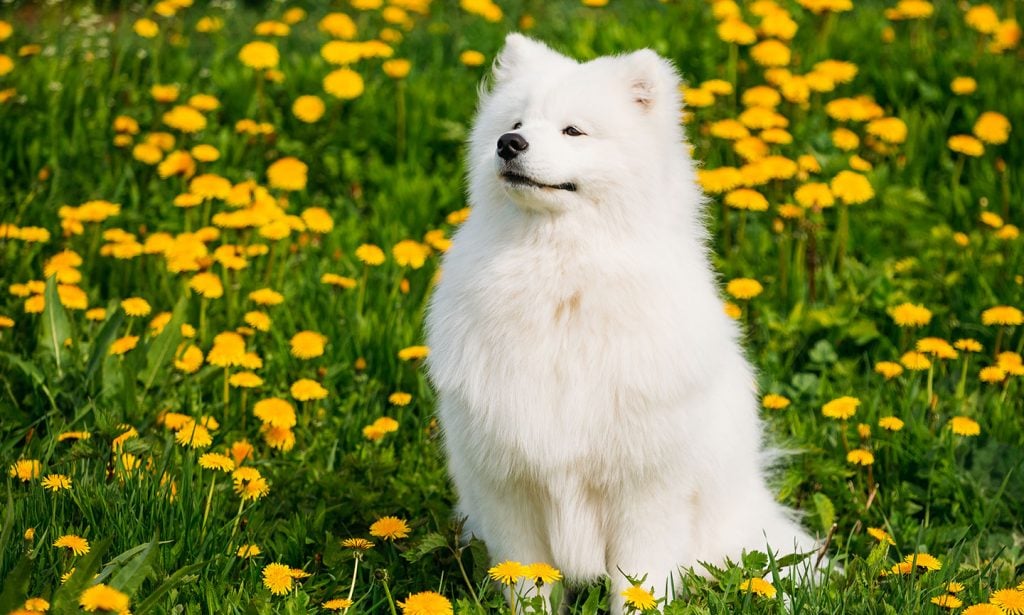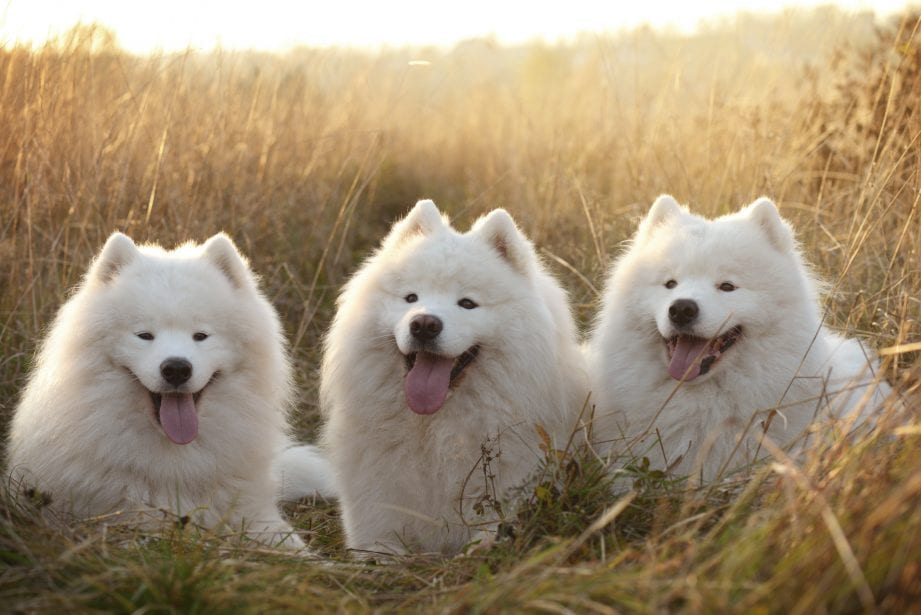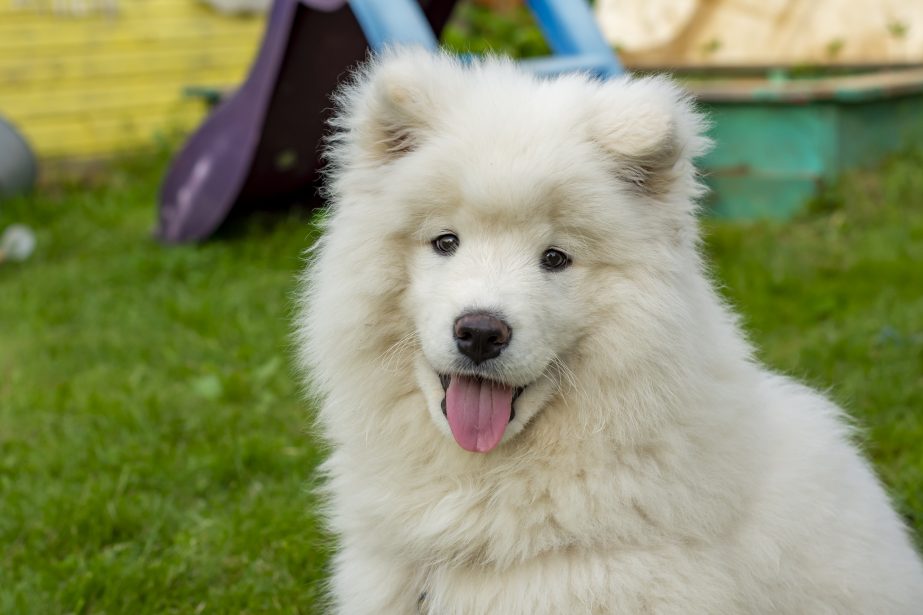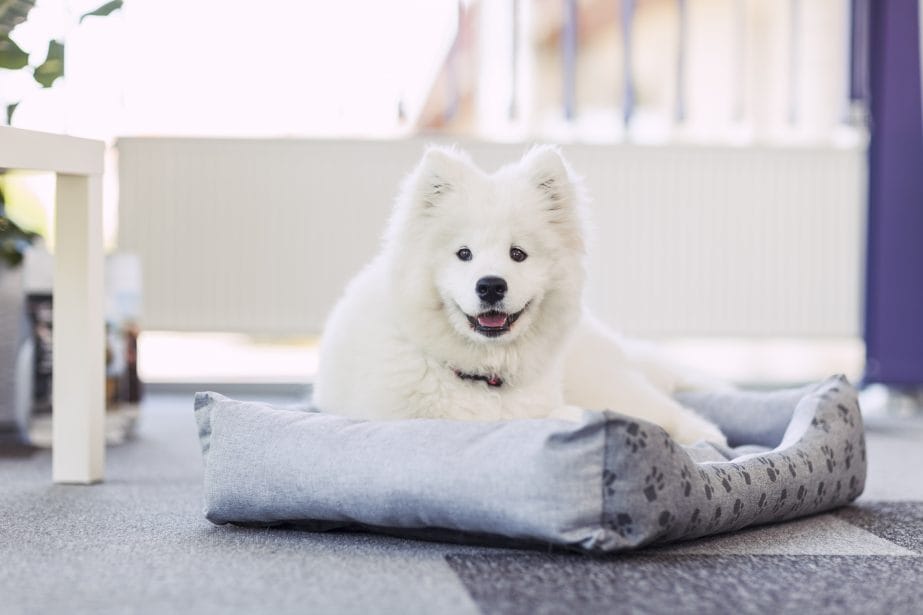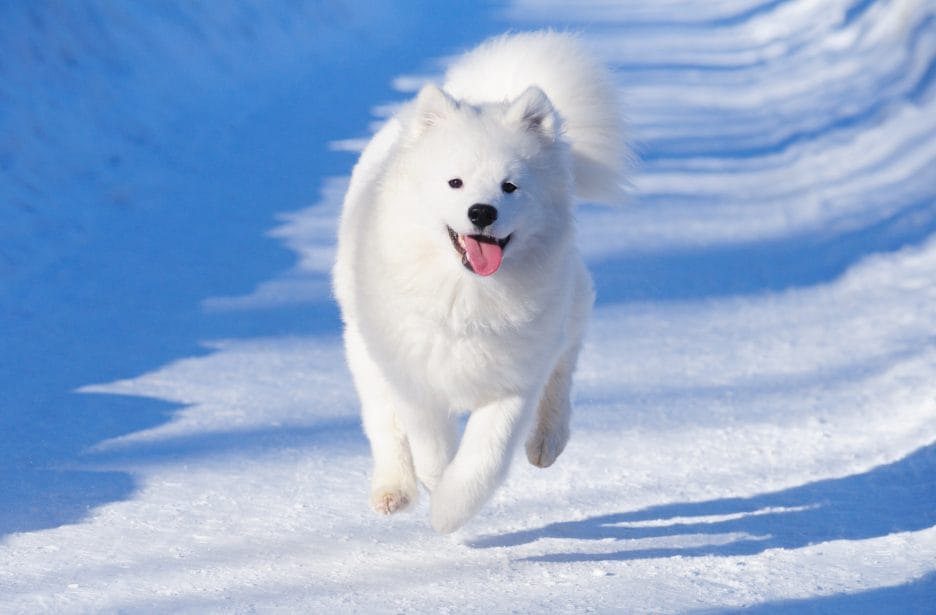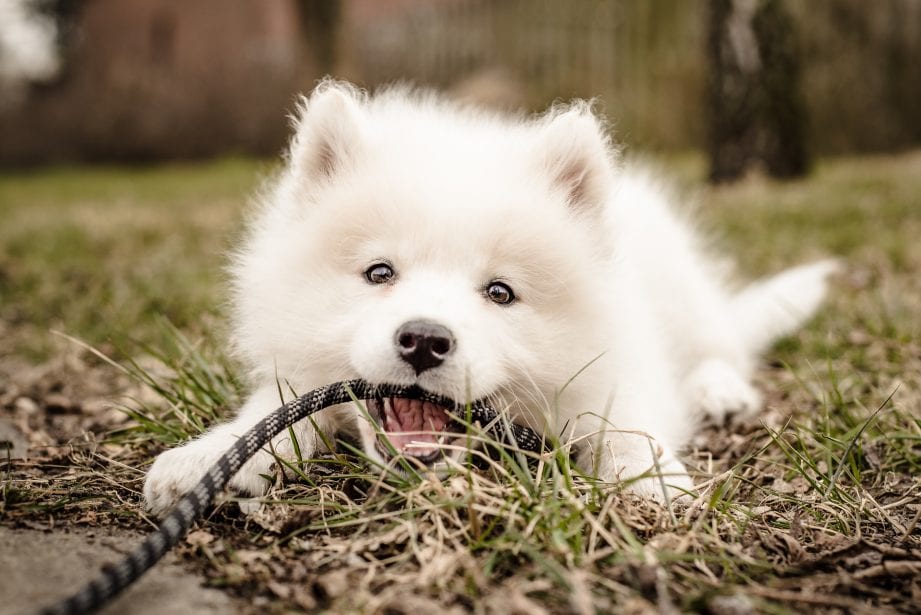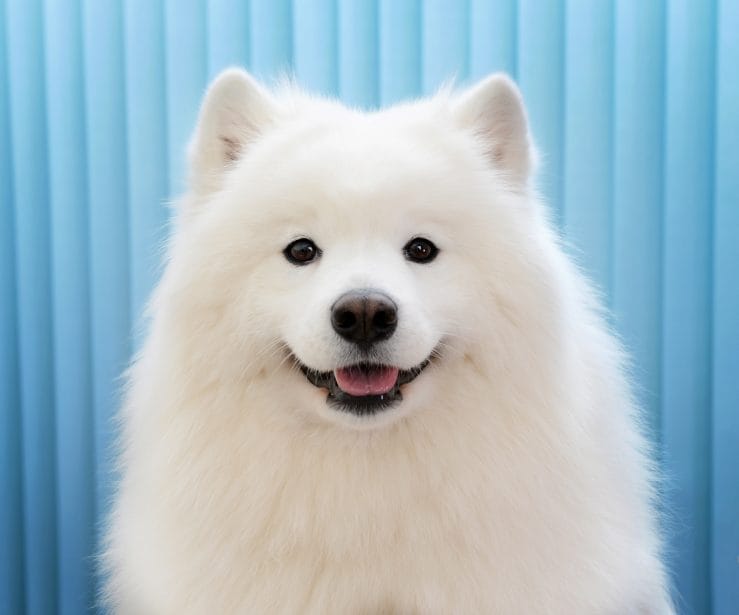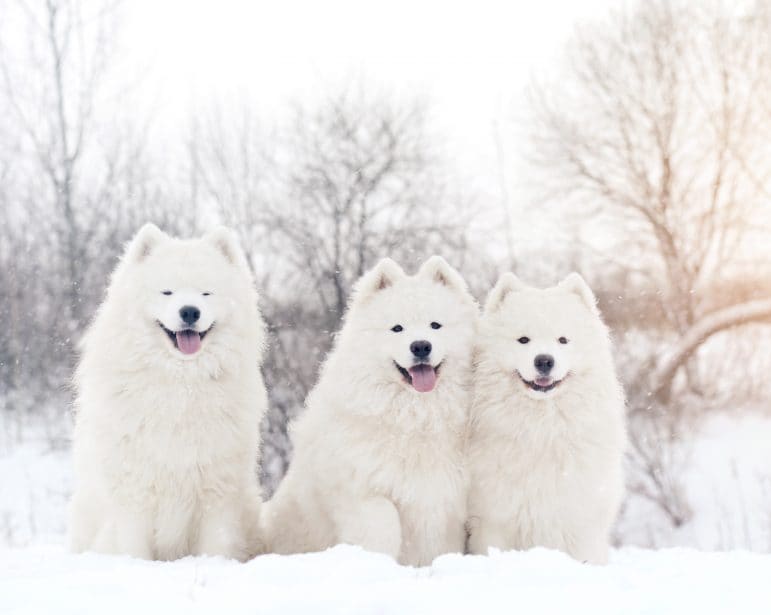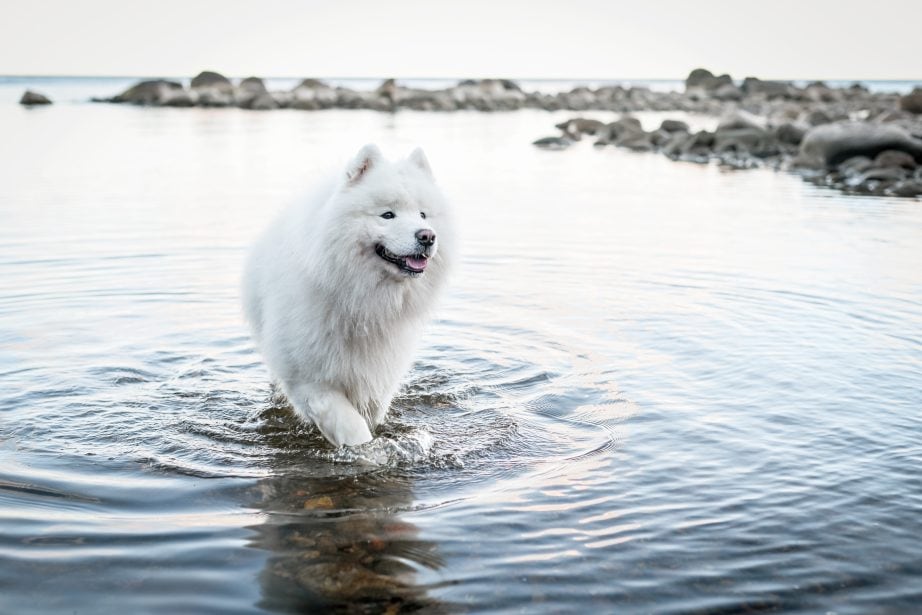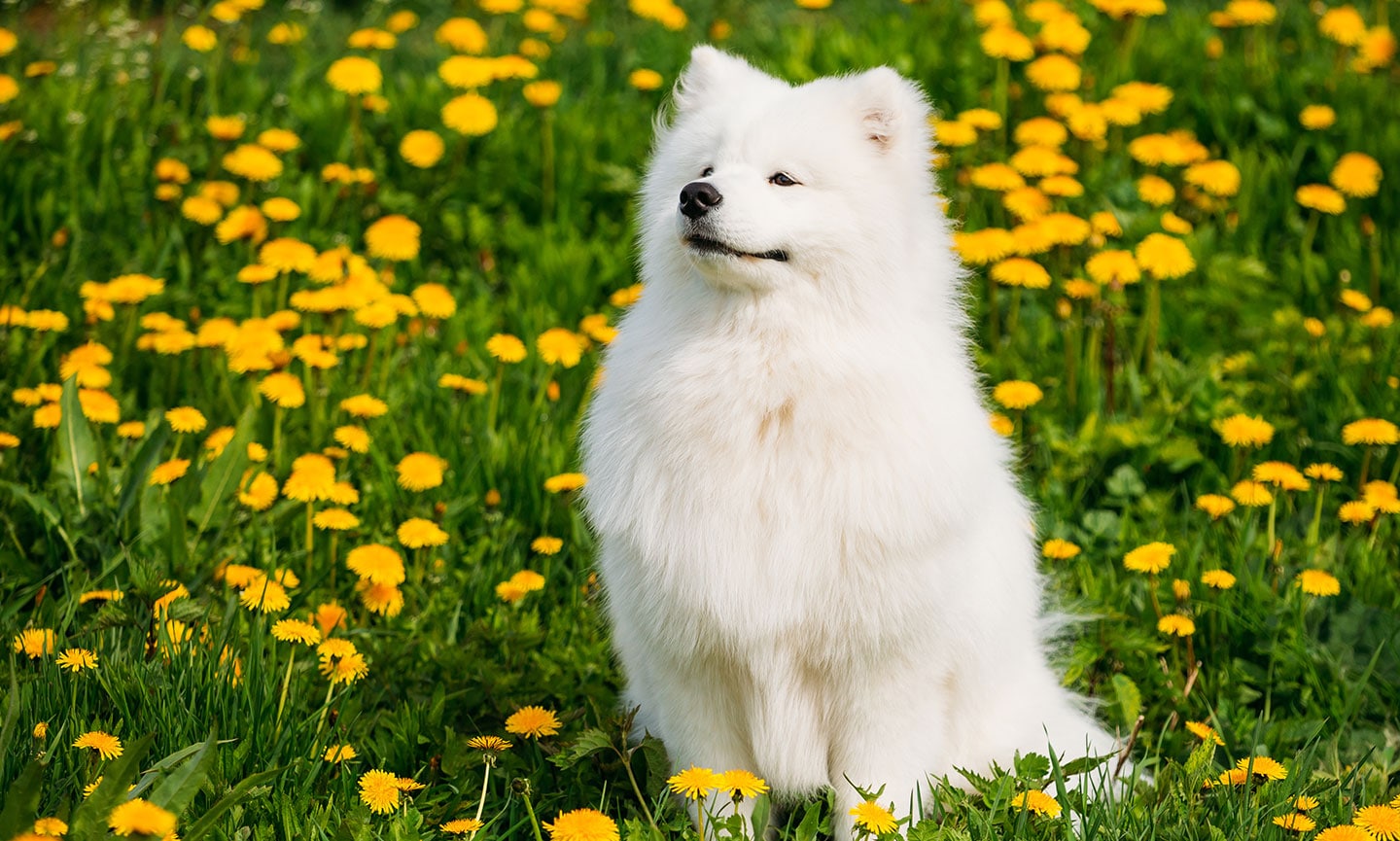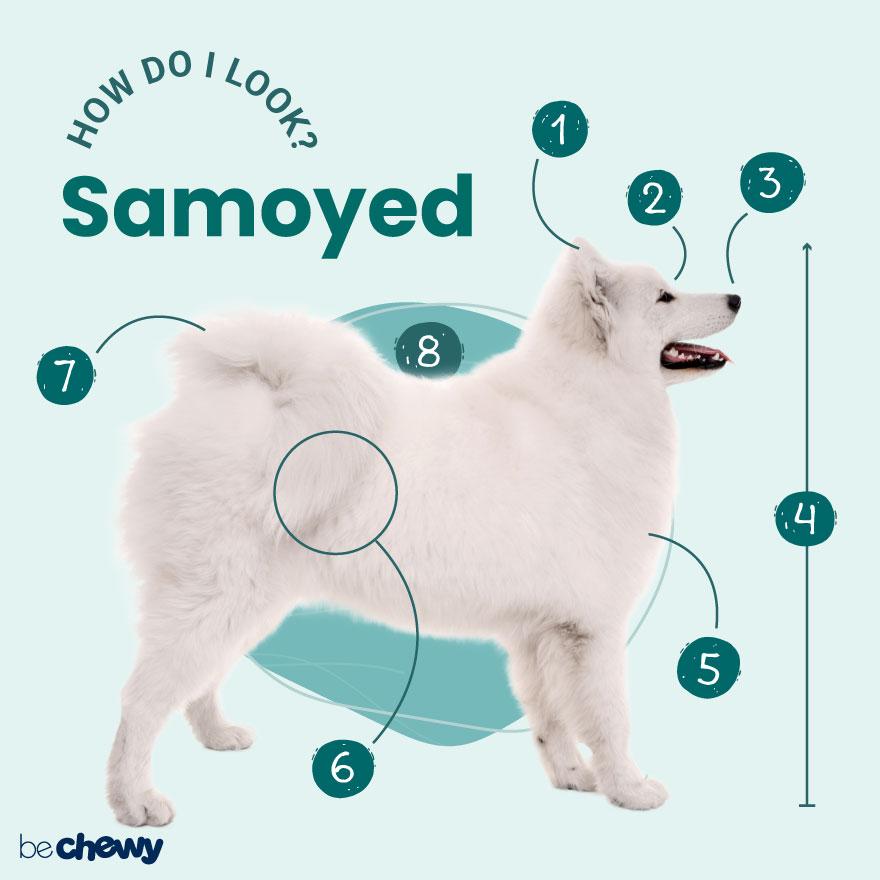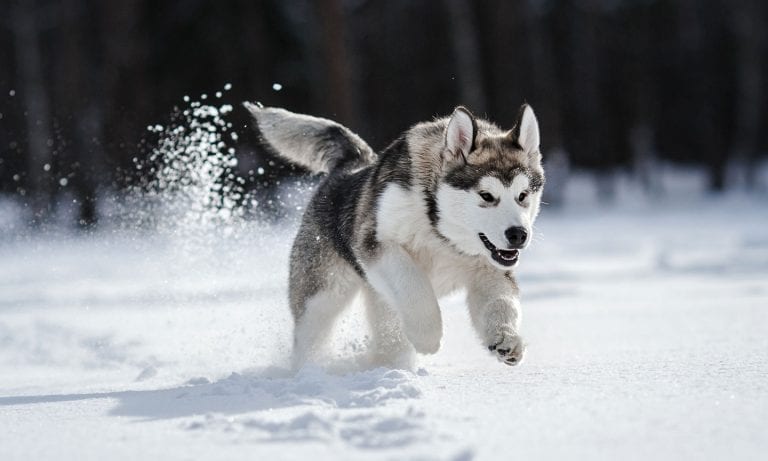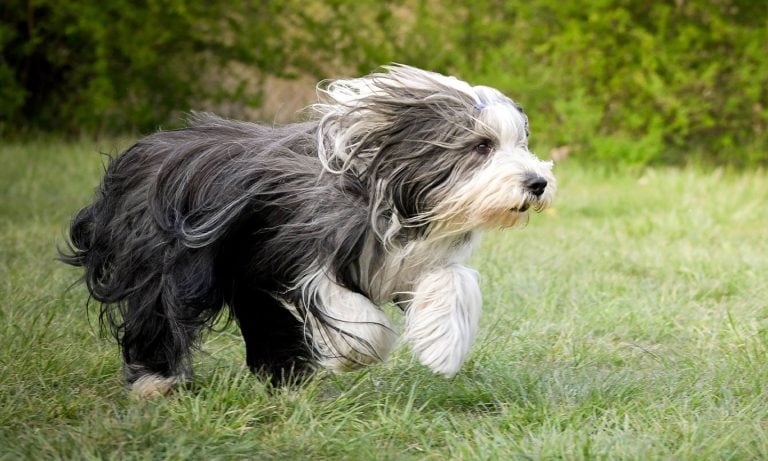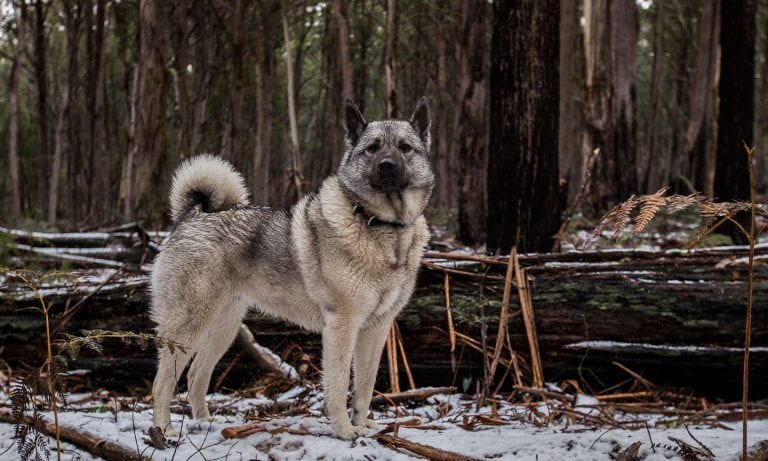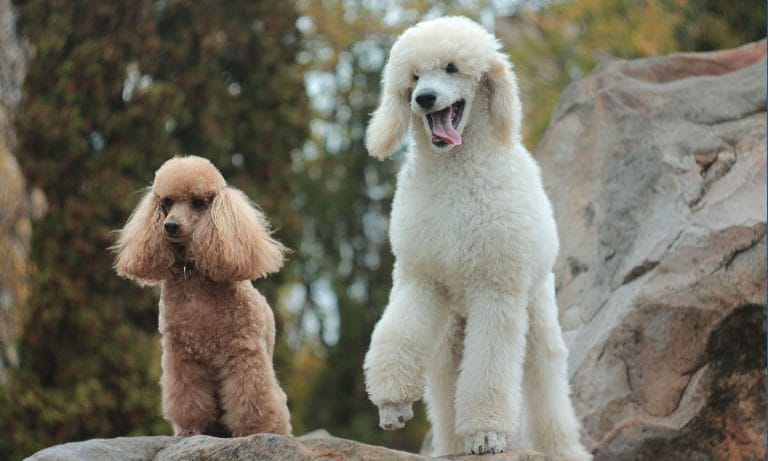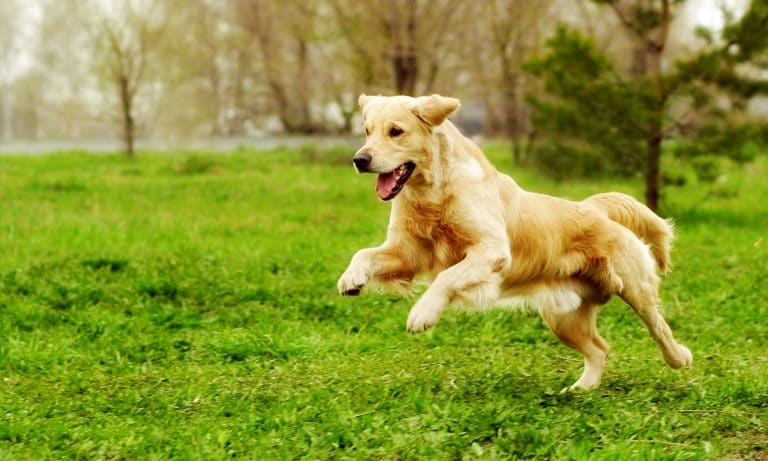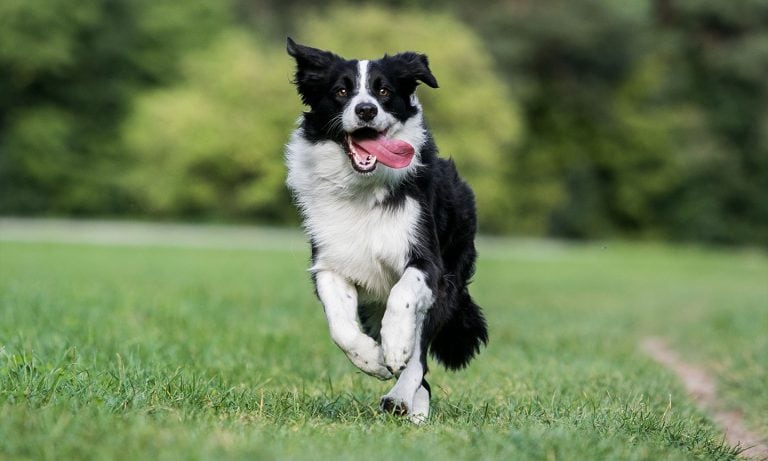Smiles are contagious. Don’t believe us? Just take one look at the Samoyed. Known for their ever-present grins, these “smiling sled dogs” will turn your frown upside down. But it’s their cheery demeanor and love for adventure that are the real mood boosters. (Did you whisper the word adventure? If you say it out loud, your Sammy’ll be out the door in a flash.) You better get your skis and snowsuits ready—Sammies love to play and “bathe” in the snow. And what better way to stay warm on a cold, frigid day than to play with your happy-go-lucky Samoyed? Smiles guaranteed.
Breed Snapshot
Temperament:
CheerySocial ButterflyEnergeticCoat Color:
WhiteCreamBiscuit
Best For
Samoyeds are majestic, fluffy Arctic dogs who require plenty of exercise and mental engagement. With their eye-catching white boat and friendly temperament, they're ideal for pet parents seeking an affectionate, energetic and stunning companion.
Samoyed Temperament
With a delightful smile ready to greet you at a moment’s notice, it’s no surprise that the Samoyed dog breed’s qualities are rooted in having fun and being the family mood-booster. Looking to make friends? Your Sammy’s good-natured temperament means you’ll end up meeting just about everyone on the block. If you want your Samoyed as a guard dog, you may want to look elsewhere. Sammies are so friendly, they’re likely to give an intruder a tour of your home.
Samoyeds (aka Siberian Samoyeds) are whip-smart and crave all the TLC. Without it, they can become mischievous to get your attention. And don’t even think about leaving them out by themselves for long. Sammies would much rather be in the house with the whole fam instead of being relegated to the outside by their lonesome. They form deep bonds with their human families and have a pack-mentality. Proper socialization is important to keep your pup active, engaged and challenged.
While they’re always up for an adventure, they can also be headstrong and a bit demanding. They won’t be afraid to tell you they need attention with their distinctive whine.
Speaking of communication, Samoyeds are fond of barking or using their teeth to get your attention. This is more common when Sammies are not fully trained, and they’ll nip or tug at you with their teeth in a non-aggressive manner. But there’s an explanation for this behavior: They’re used to grabbing their packmates with their mouths, and with their dense fur, they grip harder, so it’s natural for them to do the same with their people.
How to Care for a Samoyed
Samoyeds are high-energy dogs with high-maintenance needs. Grooming that gorgeous, wool-like coat is essential to their puffball appearance. And their independent streak equals consistent training and lots of exercise time. (No weekends off!) But hey—that just gives you more time to bond with your pup.
Samoyed Health
Samoyeds are typically healthy dogs with long lifespans of 12 to 14 years. But as with any dog, it’s essential to know what health concerns are common to the breed. By keeping an eye out for these health issues, you can help ensure that your Sammy lives a full, happy life.
- Cataracts: Like humans, Samoyeds can develop different types of cataracts depending on their age. According to the Samoyed Club of America, some types of cataracts are inherited, so annual eye examinations are vital for your pup’s overall health. Symptoms may include cloudiness in the pupil, eye inflammation and squinting. Depending on the severity, surgery may be required to help prevent blindness.
- Progressive Retinal Atrophy (PRA): This inherited disease usually means a dog will slowly go blind over time. It’s common for the eye cells in charge of night vision to begin to degenerate first, so daytime vision may be relatively unchanged in your pup for a while. Although no treatment is available yet for PRA, dogs often adjust to vision loss and lead happy lives. Genetic screening testing is available so be sure to ask your breeder.
- Uveodermatologic Syndrome: This skin and vision condition occurs when the dog’s immune system attacks melatonin production in its own body. Treatment may include immunosuppressant medications and steroids.
- Elbow and Hip Dysplasia: Samoyeds can suffer from elbow and hip dysplasia, where the joints weren’t formed properly. Look for an abnormal gait or signs of stiffness in their joints. Treatments range from weight management to physical therapy to surgery, depending on the severity.
- Cardiac Disorder: Samoyeds can inherit a heart condition called pulmonic stenosis, making it harder for blood to flow from the heart to the lungs. With this condition, the heart must work overtime to pump enough blood, so your Samoyed could collapse or run out of energy in the middle of an activity. Treatment may include medications or surgery depending on the severity.
- Hypothyroidism: When the thyroid gland doesn’t produce normal levels of the thyroid hormones, your Samoyed may be prone to hair loss, weight gain and lethargy. Treatment is typically daily oral medication.
- Samoyed Hereditary Glomerulopathy: This genetic kidney disorder can lead to kidney failure. There is no cure, but a genetic screening test is available so be sure to ask your breeder.
Samoyed History
With their fluffy, thick white coats—their defining trait—it makes sense that Samoyeds have a history tied to cold climates. The breed name originates from the Samoyedic people, a semi-nomadic people from Siberia, where temperatures can drop to minus 60 degrees Fahrenheit!
Not many can endure such harsh conditions, but Samoyeds were originally bred to be able to work and prosper in this environment—their coats keep them warm and protected no matter how frigid or windy it might be. On very cold nights, the dogs and people would huddle together to keep warm with their body heat, forming a close bond between the breed and humans. This behavior explains why, to this day, Samoyeds tend to be especially connected with their pet parents. You’re going to have quite the cuddler on your hands. (No need for an electric blanket!)
Samoyeds regularly hauled heavy loads for long distances as they pulled sleds across the Arctic tundra. They also served as watchdogs. The Samoyedic community frequently relied on reindeer for food, leather and fur. But over time, the community shifted from hunting reindeer to herding them. Eventually, their Samoyed dogs took on this new role as herders and protectors of reindeer.
How did Samoyeds go from cold climate pup to mainstream companion? In the late 18th century, Arctic explorers introduced the Samoyed to British dog lovers when they returned to England. Perhaps unsurprisingly, a royal endorsement ended up being a turning point in the Samoyed’s personal history: Queen Alexandra fell in love with the breed and promoted it to a companion and show dog. Samoyeds continued pulling sleds in Arctic and Antarctic expeditions in the late 19th and early 20th centuries. And the American Kennel Club registered the first Samoyed in 1906.
Are you looking to add a Samoyed as a pet? The best place to find Samoyed puppies today is through a reputable breeder on the American Kennel Club’s website. What’s the average Samoyed price? Depending on the breeder, expect to pay anywhere from $1,200 to $3,000 for a pup. But for that price, you’re getting a pup who’s been screened for health and temperament issues and may come with pedigree papers. You can also reach out to Samoyed rescue organizations to adopt a pup, keep an eye out for the breed at your local animal shelter or search Chewy’s database of adoptable dogs in your area.
If you see a black Samoyed advertised, run! This is a marketing ploy often designed to elicit higher prices for a pooch. Samoyeds only come in shades of white. If you’re seeing a dog who looks like a black Samoyed puppy, it’s either a mixed dog (maybe a Sammypoo) or a purebred pup that looks like a Samoyed, like a Eurasier.
FAQs
How do you pronounce Samoyed?
Samoyed is often pronounced incorrectly. Most pronounce it sam-oy-ehd. But that’s not correct! It’s sam-ah-YEED. But many pup parents just call their ball of fluff their “Sammy.”
What does Samoyed mean?
The name Samoyed’s meaning pays tribute to where the breed originally comes from—specifically, the Samoyedic people, who were a semi-nomadic people from northeastern Asia.
Are Samoyeds hypoallergenic?
No, Samoyeds are not hypoallergenic. Although a Samoyed does shed a lot, they have low dander levels and barely drool, so they may not trigger as strong an allergic reaction in some people. If you have allergies, it’s a good idea to spend time with a few Samoyeds before deciding to bring one home.
Are Samoyeds good family dogs?
Yes, Samoyeds are good family dogs. They love living life with their people, so it’s important to include your Sammy in your daily routine and activities.
Can Samoyeds live in hot weather?
Yes, Samoyeds can live in warm temperatures. If you live in warmer climates, keep your outdoor activities to the cooler parts of the day. When you are outside when it’s warmer, be sure to give your pup access to shade and lots of water to help keep them cool.
What are the most common Samoyed mixes?
The most common Samoyed mixes are:
- Samoyed-Golden Retriever mix (Golden Sammy)
- Samoyed-Poodle mix (Sammypoo)
- Samoyed-Husky mix (Samusky)
- Samoyed-German Shepherd mix (Samoyed German Shepherd)
- Samoyed-Corgi mix (Samoyed Corgi)
- Samoyed-Pomeranian mix (Samoyed Pomeranian)
Note: These are not purebred dogs but mixed breeds.
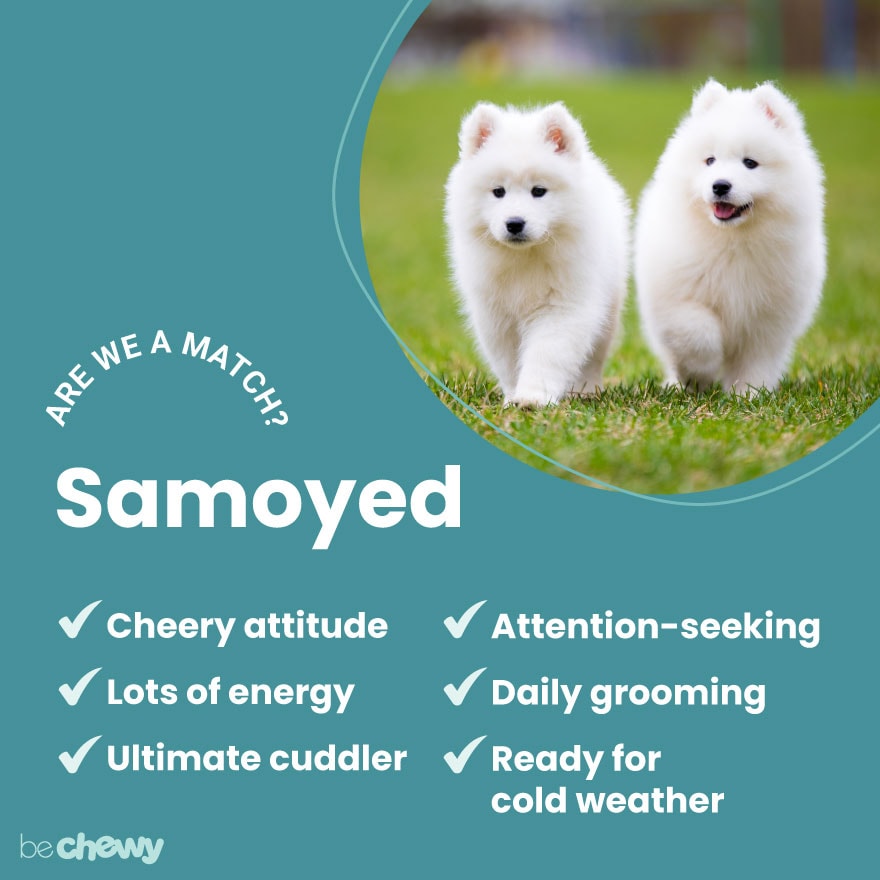
Top Takeaways
Samoyeds love to make people feel cared for no matter what. While they yearn for the spotlight—and won’t make any apologies for it—it’s hard to blame them when they’ve got such a charismatic personality. These playful, rambunctious pups make for very loyal companions who are ready to take on all the adventures with you.
Expert input provided by veterinarian Dr. Katie Billmaier, at Furry Friends Adoption, Clinic & Ranch, and Sparky Serka, head trainer at The Puppy Academy.
Breed characteristic ratings provided by veterinarian Dr. Sarah J. Wooten, DVM, CVJ, a veterinarian at Sheep Draw Veterinary Hospital in Greeley, Colorado; dog trainer and behavior consultant Irith Bloom, CPDT-KSA, CBCC-KA, CDBC, owner of The Sophisticated Dog, LLC, in Los Angeles; and certified animal behavior consultant Amy Shojai, CABC, in Sherman, Texas.
The health content was medically reviewed by Chewy vets.

Search for Adoptable Samoyeds Near You
Female Names
- Luna
- Bella
- Mochi
- Daisy
- Yuki
- Stella
- Winter
- Sasha
- Nala
- Mika
Male Names
- Koda
- Mochi
- Appa
- Leo
- Loki
- Bear
- Luka
- Yeti
- Casper
- Nimbus
Share:
